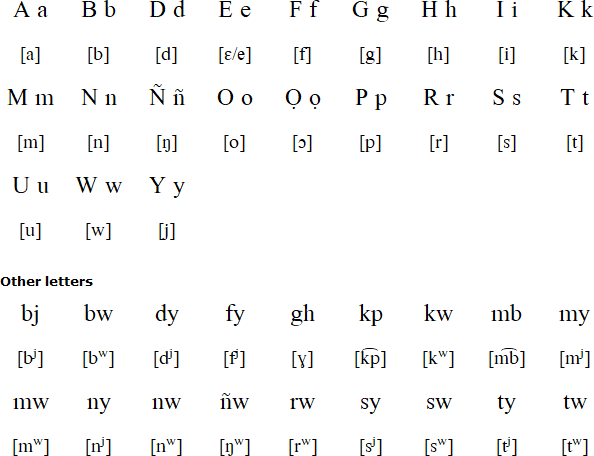Efik is a member of the Benue–Congo branch of the Atlantic–Congo language family. It is spoken in southern Nigeria in Akwa Iborn and Cross River states. In 1998 there were about 2.4 million speakers of Efik, including 400,000 native speakers. Most of the speakers live in the Calabar area of the Cross River State.
Efik is also known as Calabar, and is closely related to Ibibio. The two languages are classified by some as a single Efik-Ibibio language.
Efik was first written in 1812 by Chief Eyo Nsa, or Eyo Willy Honesty, who devised a way to write Efik with the Latin alphabet. Since then a number of spelling systems have been used to write Efik, mainly devised by missionaries. The Modern Efik Orthography was devised by the Efik Language Development sub-committee of the Obong of Calabar Executive Forum, and published in February 2012.
Efik is used in everyday life, businesses and the media. It is taught in primary and secondary schools, and also in universities and adult education. It is the official language of Cross River State.

Download an alphabet chart for Efik (Excel)
Efik is a tonal language tones can be marked as follows. However they are often omitted.
Hear the Efik alphabet
Based on: http://archive.phonetics.ucla.edu/Language/EFI/efi.html and http://efikeburutu.org/efik language.html
Oyobio ye utin ekeneni ndifiọk tiet eke ọsọñọde idem akan ufan. Ndo ndo oro asaña-isañ asaña edi, awañ idem esie ke ndodobi ọfọñ etuep. Mmọ enyime ete akpa owo emi edinamde asaña-isañ osio ndodobi ọfọñ esie efep enye oro edidi ọsọñ idem ñkan enye eken. Ekem oyobio abara ke ofri ukeme esie, edi nte enye ọsọsọñọ abara ntre ke asañ-isañ ototim ọsọñọ ada ọfọñ esie awañ idem, ndien kutit oyobio osioño idem efep. Ekem utin asiaha, eyo onyuñ ayat ọkpọsọñ, ndien ndo ndo oro asañ-isañ osio ọfọñ esie efep. Do ntre oyobio okut onyuñ enyime ete ke utin edi andikan kotu mmọ mbiba.
The North Wind and the Sun were disputing which was the stronger, when a traveller came along wrapped in a warm cloak. They agreed that the one who first succeeded in making the traveller take his cloak off should be considered stronger than the other. Then the North Wind blew as hard as he could, but the more he blew the more closely did the traveller fold his cloak around him; and at last the North Wind gave up the attempt. Then the Sun shone out warmly, and immediately the traveller took off his cloak. And so the North Wind was obliged to confess that the Sun was the stronger of the two.
Source: http://archive.phonetics.ucla.edu/Language/EFI/efi_story_0000_01.html
Alphabet and sample text supplied by Michael Peter Füstumum
Information about Efik | Phrases | Numbers | Tower of Babel
Information about Efik
https://en.wikipedia.org/wiki/Efik_language
http://www.ethnologue.com/language/efi
https://www.duolingo.com/comment/4649636
http://www.mediafritiq.com/2012/05/05/efik/
http://efikeburutu.org/efik%20language.html
Efik phrases
http://calabarforum.org.uk/learn-efik-phrases
Abua, Bandial, Bariba, Berom, Cebaara, Efik, Esimbi, Ibibio, Iceve-Maci, Jibu, Jju, Kambari, Kar, Kim, Kissi, Kom, Laalaa, Limba, Mbum, Mono, Mundang, Nafanan, Noon, Obolo, Safen, Supyire, Temne, Ubang
Languages written with the Latin alphabet
Page last modified: 22.11.24
[top]
You can support this site by Buying Me A Coffee, and if you like what you see on this page, you can use the buttons below to share it with people you know.

If you like this site and find it useful, you can support it by making a donation via PayPal or Patreon, or by contributing in other ways. Omniglot is how I make my living.
Note: all links on this site to Amazon.com, Amazon.co.uk
and Amazon.fr
are affiliate links. This means I earn a commission if you click on any of them and buy something. So by clicking on these links you can help to support this site.
[top]